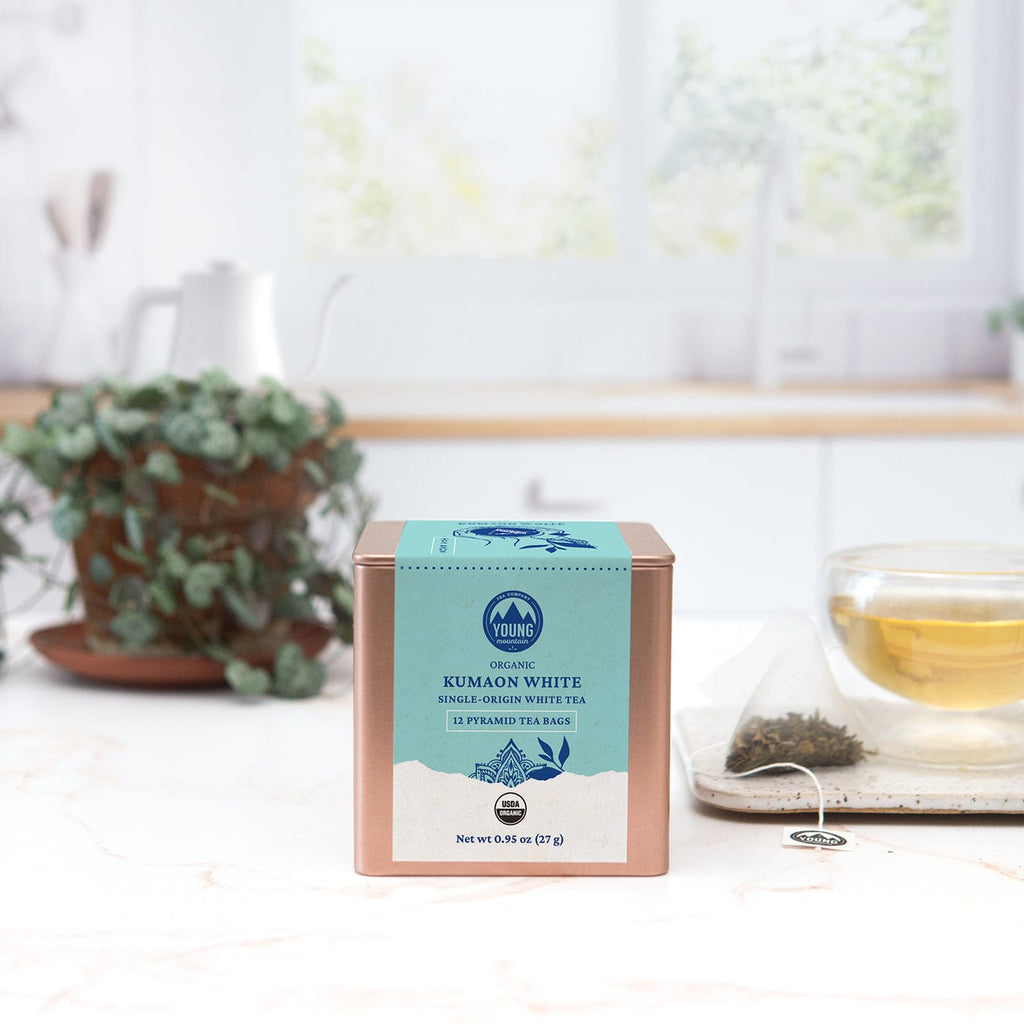

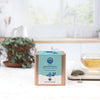
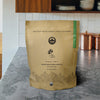
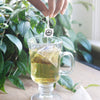
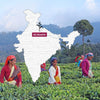
$15.99
An organic white tea with a juicy body and fresh, lingering finish. Made from ancient tea bushes in the early spring, this tea straddles the line between traditional white and green. We’re working with Kumaon tea farmers to launch their region’s first farmer-owned tea factory to make this tea, which is also available as a loose-leaf tea.
Tasting Notes: Peeled cucumber & honeydew melon
Origin: Kumaon, North Indian Himalayas
Tea Maker: Champawat Village
Infusion Suggestions:
Steep 1 8 oz | 180 F | 3 min
Steep 2 8 oz | 210 F | 4 min
Certifications: USDA Organic
Contains Caffeine
Taste: As the least processed tea type, many white teas end up so delicate that they are almost flavorless. Thankfully, not this tea! Our organic Kumaon White has juicy notes of honeydew melon with a bright body that makes it shine. Made in spring, the tea captures the floral, clean aromas of new growth. As it steeps, the leaf releases vegetal notes of peeled cucumber, blurring the line between traditional green and white teas. While the tea ages, it gains a smooth depth, so as long as it’s stored well, you can enjoy this tea for years to come! Drinkers of White Peony (Bai Mudan) or Green Jasmine Pearls will enjoy this tea.
Production: The best white teas are made in spring. In Kumaon, that’s typically late March or early April. Tea farmers exercise great care to protect the harvested leaf from damage as it is moved in bamboo baskets from their tea gardens to the processing site. Unlike green and black teas, white teas undergo no rolling, keeping the flavors locked in the leaf. The taste of Organic Kumaon White can be partially attributed to the power of the ancient tea trees that are harvested for this tea. The British planted seeds brought from China (or smuggled, depending on who is telling the story) in the 1830s, making them some of the oldest tea bushes in India. We’re especially proud of this tea, because we played a role in its creation: in 2015, we asked a local tea maker named Desmond Birkbeck if he could make us a white tea from his family’s garden. At the time, he hadn’t heard of white tea, so was intrigued by the challenge. Standing around a cupping table in a local processing facility, we drank a sample of white peony tea from China. Desmond crushed the tea in his hand, breathed in the aromas and said “If this is what you want, I can do it.” Today, we’re proud to be the only importer of Kumaon White in the world.
Region: Tucked in the Himalayan foothills, Kumaon sits just on the border of Nepal, making it one of the most isolated Indian tea regions. When the British introduced tea to India in the 1830s, they were drawn to Kumaon because of its well-drained, acidic soils. The plant thrived on the adopted slopes, but the region’s remoteness prevented the British from moving the tea from the mountains to the port. By the 1920s, the British began to abandon or sell the promising-but-isolated Kumaon tea gardens. The Birkbeck family bought a garden, and for several decades, they were the sole torchbearer of Kumaon tea. In the 1990s, the local government joined forces with the Birkbecks to help other local communities grow tea, and sold the Kumaon teas in the auction. Then in 2015, we brought over the first lot of Kumaon teas to the US, making us the first US importer of Kumaon teas. Today we’re excited to continue the work of introducing Kumaon teas across the globe.
Tea Makers: Desmond Birkbeck comes from the only family that stayed in tea after the British pulled out in the 1920s. Desmond grew up on his family’s tea garden named Chirapani, which means “split water” and is named for the waterfall at the top of their tea garden. Desmond proudly tells the story of writing to the Tea Board of India when he was 14 years old, requesting that his family’s tea garden be able to sell into the Kolkata auctions. Now he is a leading force in his village and the Kumaon region, working to use tea to uplift local tea farmers.
Impact: In Kumaon, our relationship runs deepest. For more than a decade, we’ve worked side-by-side with Himalayan farmers to build a new model of tea, rooted in shared ownership, regenerative agriculture, and community leadership.
Together, Young Mountain Tea and local farmers co-own India’s first farmer-led specialty tea factory, launched in 2025. It’s the result of years of joint capacity building including training in organic cultivation, small-batch processing, and leadership development. Today, ~500 farmers in the Champawat region produce 30,000 lb of certified organic tea each year, and 90% of them are women earning their first-ever independent income through tea.
Farmers earn in two ways: first, by selling their harvest to the factory at 5x commodity rate; and second, by sharing in the factory’s future profits as co-owners. Alongside this economic transformation, we’re also restoring the land, running regenerative agriculture trials that compare biochar, home compost, and cow-dung fertilizers to revive once-abandoned hillsides with thriving organic tea bushes.
Our long-term goal is to develop the Kumaon Model as a blueprint for how tea can uplift Himalayan communities, beginning with 6,000 farmers across Kumaon and ultimately inspiring change throughout the global tea industry.
1% of all Young Mountain Tea sales directly support the factory’s launch and the farmers who will own it. Learn more.
Packaging: Our commitment to sustainability means we offer our teas in several types of packaging: